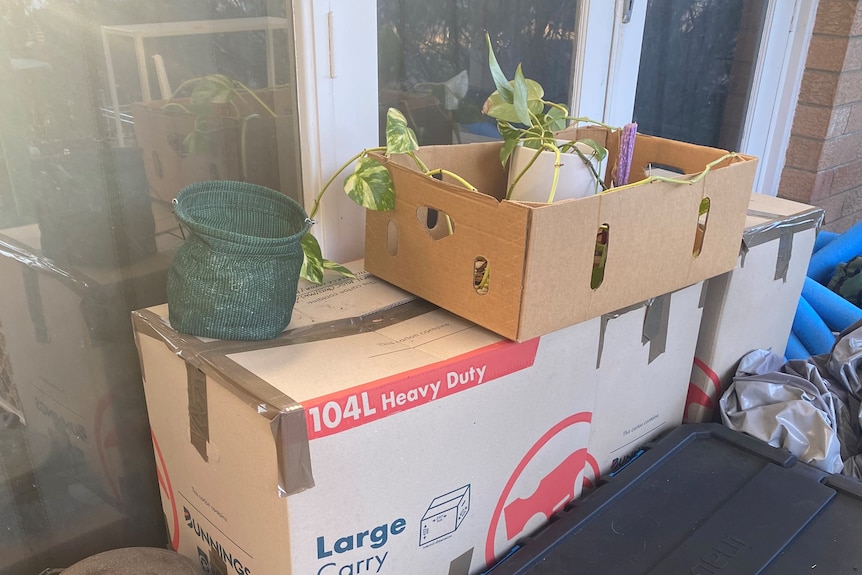‘I feel like a failure’: Psychological problems of the recruitment crisis
It’s an early autumn morning in Perth and 26-year-old Madi is sitting a in the yard in his pajamas while sipping a warm cup of coffee.
He can see the blue sky through the branches of the trees as he is swayed by the wind.
Madi is up early for a phone interview with ABC RN’s All in the Mind, and she’s out because she doesn’t want to wake up the rest of the house.
She recently moved in with her partner’s family, and while she’s grateful to have a roof over her head, the situation isn’t great.
“As everyone has a home, and is as loving and caring as everyone else, you feel like you’re stepping on someone else’s space and invading their space.”
Loading…
Madi and her partner moved out of necessity, after several rental applications were rejected.
They lined up behind a line of desperate home-seekers, competing fiercely for the highest-priced dive. One old dark and dusty place felt like “somebody died in there”, he recalls.
And you’ll be lucky to get anything longer than six months’ rent.
But despite both having a full-time salary, Madi and her partner were let down – repeatedly.
Madi felt like she was asking for a house, or had to “sell” real estate agents “as a product or service”.
“It just makes me feel like a weakling.”
Worse, he began to feel like it was all his fault.
“It’s just very stressful.”
His story is becoming more and more popular.
And the psychological stress of hiring can not only bring you down, but research suggests that it can affect your self-esteem, and even distort your outlook on the future.
Housing problem related to mental retardation
Back in 2011, University of Melbourne epidemiologist Rebecca Bentley conducted her first research into the relationship between housing crisis and mental health.
He looked at the psychological effects of rising rents and mortgages on low- and middle-income people.

When this group began spending more than 30 percent of their income on housing, they were more likely to be at risk of conditions such as anxiety and depression.
“We’ve actually seen, at the population level, a negative impact on their mental health,” says Professor Bentley.
“It was really an issue that affected low-income families or very middle-income families. But now I think it’s global.
“Even people with good incomes are struggling in the housing market.”
Home ownership remains unaffordable, while at the same time median rents are very high, and vacancy rates are very low.
Professor Bentley’s research has found that renters are more likely to suffer from mental illness due to housing stress.
He recently found “double exposure” – a combination of unsafe housing and unsafe work – is associated with worse mental health and health outcomes.
A generational issue?
A study conducted last year showed the increasing pressure of housing pressure in the last two decades is accompanied by a dramatic increase in the number of people who have returned to their homes.
And while some do well in this environment, the same won’t happen for many who move back into their 30s, or even from their late 20s.
“We looked at their mental health and found one of the worst effects on mental health [linked to housing stress],” Professor Bentley says.
But while we hear a lot about younger generations being particularly disadvantaged when it comes to housing, Professor Bentley says it’s not that black and white.

It’s true that as a group, he found that the recruits are the most affected, and these tend to be young.
But for people in their 50s and 60s who, for whatever reason, have trouble finding affordable housing, the results can be even more significant.
“It actually hits them harder than young people,” says Professor Bentley.
This can happen because older people have less ability to increase income or move to another place, he adds.
The psychology of housing insecurity
While Professor Bentley’s research highlights the role of financial stress caused by housing in mental health, other studies focus on the psychological dimensions of housing insecurity.
“The ability to stay safe is a fundamental form of all our lives,” RMIT Center for Urban Research Priya Kunjan says.
But ever since housing was “used” after the Industrial Revolution, an increasing number of people have been affected by insecurity.
When people can’t afford rising rents, they face an unstoppable scramble to find a new home they can afford, Dr Kunjan says. And if they have to move far from their original home, this comes with its own pressures.

In ongoing ARC-funded research into “dangerous housing”, Dr Kunjan interviewed a small but diverse sample of Victorian tenants, and found they place a high value on housing within their community.
Dr. Kunjan found that when people had to move, they made an effort to stay in one place at least, so that they could maintain their relationships with neighbors for example.
“Decreasing prices in those areas was a big disappointment for people.”
Lack of control and ‘learning helplessness’
Dr. Kunjan found that the tenants were surprised by their lack of agency: “It is this feeling that their lives, their homes, were in the power of others.”
And this is something that psychologists say can be bad for us.
When people feel that they have no control over their lives, this can lead to self-doubt, even in well-intentioned people, says psychologist Gene Hodgins of Charles Sturt University.

Repeated repetition, for example, of rental applications can lead to “learned helplessness”, Dr Hodgins says.
“It’s almost like a coping mechanism for me, why keep trying if you’re going to keep getting bad results?’
And this can make a person very depressed and anxious, which makes things worse.
As well as having enough confidence, we can also include a lack of confidence in other areas of our lives, such as whether it’s worth applying for certain jobs, says Dr Hodgins.
All these are related to Blood.
I feel like a failure.
Her experience of looking for a place to rent left her feeling insecure, and unsure of what else to do.
“You know, I got a job. I tried to save money. I tried to be an active member of my community. I tried to do all the things that would be expected of me and that I think my family or a great nation can expect from me.”
Forcing compromises and twisting the future
Dr Kunjan found that housing-related stress would not only cause people to compromise their lives or activities that bring them joy, but it could also damage the way they think about their future and place in life. it.
Not knowing where they will be can put a person in “limbo” waiting for their life to begin.

And this can affect decisions such as whether they start a family or invest in domestic relationships.
Madi tries not to think too far ahead, but her constant preoccupation with finding affordable housing makes her dreams feel out of reach.
“I’ve always been in public service or community service, and that’s what really makes me happy,” she says.
“But now I’m thinking about something like mining, or going into mining, just so I can have a chance to get a house or get financial freedom.”
It was something he would never have thought of doing before.
“I’m not inclined to go do it unless I feel it’s necessary right now.”
However, Madi soon had a lucky break, and was able to find rent at a friend’s place for “partner fees”.
“I call it my golden goose,” he says.
Now she and her partner can stop living in storage containers and return their dog to be unsupervised elsewhere.
But his gratitude is also drowned in sadness.
“My heart is still heavy with compassion for those who don’t have friends and family in a supportive position like ours.”
Listen to the full episode about how the housing crisis is destroying people’s vision of the future and subscribe to All in the Mind go explore other topics in psychology, brain and behavior.
Loading…
Get a selection of mental health news from ABC by subscribing to our monthly newsletter.
#feel #failure #Psychological #problems #recruitment #crisis
